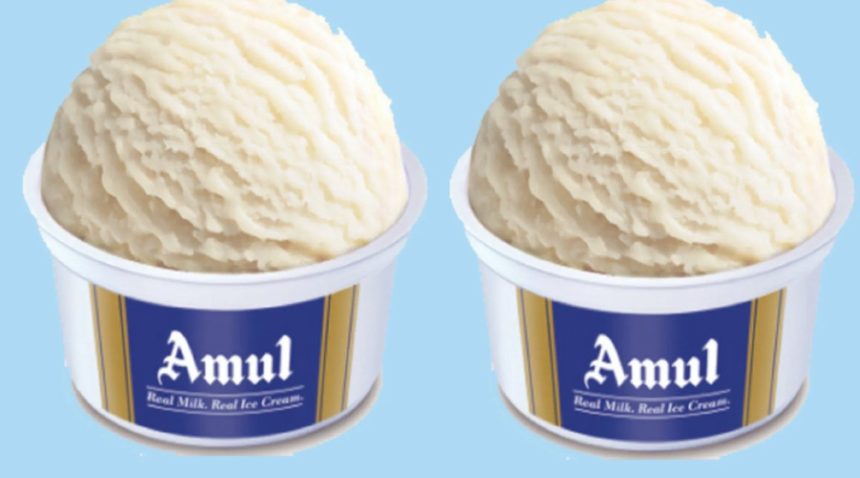Powered by 3.6 million farmers, 100+ plants, and a legacy of trust, innovation, and deliciousness
Amul has once again proven to be India’s number one food brand. It was ranked as the most valuable food brand in the country with a brand value of $4.1 billion in 2025. This value is far ahead of other big names in the food sector. Even well-known brands like Mother Dairy, Britannia, and Nandini could not come close to Amul’s brand strength. What makes Amul special is not just its popularity, but the deep trust it has built with Indian consumers over the years.
Apart from leading the food sector, Amul also ranks high among India’s top 100 brands across all industries. It holds the 17th spot, which shows that it is not just a dairy brand but a national icon. Amul continues to grow stronger while its competitors are still trying to catch up.
A Unique Cooperative Journey
Amul’s journey began in 1946 in a small town called Anand in Gujarat. It started as a movement to fight against unfair milk prices given to farmers. The people behind Amul created a cooperative model that helped farmers get fair rates for their milk. In this system, the farmers themselves own and control the company through local village unions and state-level organizations. This model later became the base for India’s famous White Revolution.
Today, the Gujarat Cooperative Milk Marketing Federation (GCMMF), which markets Amul products, represents over 3.6 million farmers. The company collects and processes around 32 million litres of milk every day through more than 100 factories. This large network ensures a steady supply of fresh milk and dairy products across the country. It also helps farmers earn a fair income, making Amul not just a business success, but also a social one.
A Wide Range of Products
Amul is not just about milk. Its product list includes butter, ghee, cheese, paneer, curd, flavored milk, chocolates, sweets, ice cream, and even protein-rich health foods. These products are available in every corner of India, from big cities to small villages. Amul has also started exporting its products to several countries, including the United States, Spain, and others in Europe and the Middle East.
Recently, Amul launched fresh milk in Spain, beginning with cities like Madrid and Barcelona. The company plans to expand to Germany, Switzerland, Italy, and Portugal. By entering the European market, Amul has shown its ability to compete with international dairy giants.
Innovation That Goes Beyond Food
Amul has always stayed ahead by adopting new ideas. One of its recent innovations involves using whey, a by-product of cheese-making, to produce bioethanol. This clean fuel can be used to reduce pollution and dependency on fossil fuels. A trial plant in Gujarat was able to turn 450,000 litres of whey into 20,000 litres of ethanol. Encouraged by this success, Amul is now building a full-scale plant with a daily capacity of 50,000 litres.
The company is also investing in converting cattle dung into bio-gas and organic fertilizer. These steps are part of Amul’s commitment to sustainability and its efforts to build a cleaner and greener future. These innovations not only help the environment but also provide extra income to farmers.
Advertising with a Smile
One of the reasons for Amul’s strong brand image is its creative and humorous advertising. The little cartoon girl, known as the Amul Girl, has been appearing in newspaper ads and billboards since the 1960s. She comments on current events and news, funnily and cleverly. These ads are loved by people of all ages and have helped Amul build a strong emotional connection with Indian families.
This kind of advertising has made Amul stand out from the crowd. Unlike other brands that focus only on their products, Amul uses wit and charm to stay in people’s minds. It is not just selling butter or milk—it is telling stories and sharing opinions, which makes it part of daily life.
Leadership with Vision
The company is currently led by Jayen Mehta, who took charge as the Managing Director in 2023. Under his leadership, Amul has continued to grow and expand into new areas. Mehta also holds key positions in international dairy organizations, which helps bring global attention to Indian dairy practices.
Mehta has played an important role in promoting clean energy projects like bioethanol and biogas. He has also focused on increasing farmer earnings and improving product quality. His vision for the future is to make Amul a global dairy leader while staying true to its cooperative roots.
Expanding Across India
Amul is not only focusing on exports. It is also working to increase its presence in the eastern and northeastern parts of India. A new milk processing plant is coming up in Assam, with an investment of over ₹100 crore. This plant will help collect and process milk from over 20,000 farmers in the region. Amul is also building more plants in Andhra Pradesh and Maharashtra.
By spreading its operations to different parts of the country, Amul is making sure that more farmers get access to its cooperative model. It also helps in supplying fresh products to every part of India. This kind of expansion strengthens the bond between the brand and the people.
Consumer Trust and Brand Loyalty
Amul has earned the trust of millions of Indian consumers over the decades. Its products are seen as safe, affordable, and high quality. The brand has been rated AAA+ with a Brand Strength Index of over 91, one of the highest scores in India. People choose Amul not just for taste, but also for the values it stands for—fairness, honesty, and Indian pride.
The company follows a farm-to-fork model, which means the entire supply chain, from the farmer to the store shelf, is transparent and controlled. This gives customers confidence that they are buying fresh and ethically sourced products.
Facing Challenges Ahead
Even though Amul is doing well, the road ahead is not without challenges. More and more private players are entering the dairy sector. There is pressure to innovate faster, maintain quality, and keep prices competitive. Global expansion also brings its own risks, such as different food laws, local competition, and customer preferences.
Another challenge is making sure that the new green energy projects are successful and beneficial for all. These projects require big investments, planning, and long-term commitment.
The Cream of India
Amul is more than just a food brand—it is a symbol of India’s progress, resilience, and unity. From small farmers in Gujarat to supermarkets in Spain, Amul’s journey reflects the power of cooperation and innovation. Its strong foundation, wide product range, smart advertising, and social values have made it India’s most trusted food brand.
As it grows, Amul remains rooted in its mission—to serve farmers, delight customers, and bring value to every home. Truly, Amul remains the cream of the crop in India’s food industry.





